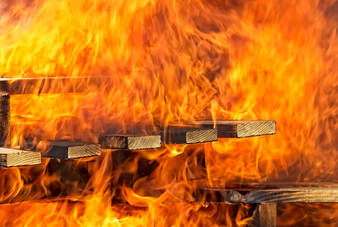 Photo: Ricardo Gomez Angel
Photo: Ricardo Gomez Angel What you protect your children from is a question to ponder when regarding lifestyle choices. But there is no question about the protection you owe your children when it comes to their physical safety. Protecting our kids from the danger of fire is one of the most critical responsibilities of a parent. Below is an article that every parent should read, with lessons all families should learn and practice regarding that responsibility.
Be sure to click on all the links to get invaluable and lifesaving information!
Thanks to: CrownFire — Fire Protection & Life Safety!
 Photo: Ricardo Gomez Angel
Photo: Ricardo Gomez Angel As a parent, ensuring the safety of your children is one of, if not the most important thing in your life. You try your best to protect them as they grow up and prepare them for when they’re on their own. Even then, their safety is still in the back of your minds.
When is the last time you’ve talked with your kids about fire safety? Would they know what to do if they smelt smoke or saw a fire? Because flammable materials that could easily catch fire surround us, it’s important to teach your children fire safety.
Do You Have Escape Routes?
It’s crucial to ensure your children know how to escape the house safely if it was on fire. Not even that, they should have an idea as to what an escape plan is all together. Starting with your home, walk through the designated spots they would use to get out of the house. If at all possible, try and decide on two routes out of every room in the house.
How to Safely Escape
It is one thing for kids to know that they need to escape if they’re caught in a fire. However, how to safely escape, that is a whole other thing to teach them. In case you are not around or incapacitated when a fire breaks out, ensure that they know to stay down low, to touch a door before going through to see if it is hot, and never to hide. Once they are safely outside, they should go to the neighbors for help, or call 911 if they have a cell phone.
See or Smell Smoke?
Smoke is a major indication of a potential fire. The only thing, though, is that there are different types of smoke depending on what is burning. First, teach your children what the smell of a burning fire smells like versus the smell of burnt food from the kitchen or any other form of a controlled fire.
Most likely if you see or smell smoke, the smoke detector should go off. Take your children to test all the smoke detectors, so they know what they do, how they work, and sound. If they do not go off though, ensure your kids know that if they see smoke from a fire in the house to head to their nearest escape route as discussed.
Know When to Call for Help
It’s a good idea for your children to know the difference between an emergency fire and a fire that is okay. For example, a flame to cook food wouldn’t require emergency services, but an out of control fire in the kitchen likely would.
Encourage your children to call for help if they ever spot a fire hazard. If they see an open flame near flammable material, that would be a sign to call for an adult to point out the danger. The more you can teach your kids about flammables, ignitions, and the types of fires, the better off they will be.
Fire safety should be a regular conversation you have with your children. As they get older and start to stay by themselves, you want to ensure they will be safe while you’re gone. Go through fire drills frequently to see where you can help them out.









